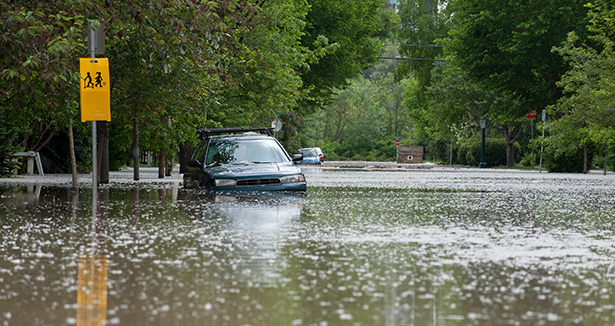
Standard CAN/BNQ 3682-420
Existing Sanitary Sewer Systems - Inflow and Infiltration Reduction Program - Guidelines
Inflow/Infiltration (I/I) in sanitary sewer systems is a chronic issue throughout Canada. Negative consequences of I/I include increased risk of flooding associated with sewer backup, multiple risks to the environment and risks to public health and safety.
I/I can reduce the capacity of pumping stations and sanitary sewer systems, hence limiting the development of urban communities. It can also can severely affect the ability of existing sanitary sewer systems to adequately serve municipalities, by generating, among other things, sewer backups and basement flooding. Then, significant works may be necessary, such as rebuilding a pumping station or increasing the capacity of a sewage treatment plant. From an asset management point of view, it can happen that pipes, originally designed to serve future developments, are entirely occupied by infiltrations. With this in mind, it is therefore more efficient and economical to reduce I/I instead of financing expansion works. Reducing I/I also facilitates pollutants treatment in sewage.
Thus, this standard has been developed to improve the management of municipalities' existing assets by providing them with efficient and cost-effective tools to help them fully understand the impact of I/I on their sanitary sewer systems. It aims at helping municipalities in assessing risks correctly before they spend large sums on studies and rehabilitation work. Finally, the guidelines proposed in this standard will help municipalities prioritize initiatives and find appropriate and cost-effective means to reduce the problems caused by I/I.
This standard sets out guidelines related to the following:
a) data collection and analysis relevant to I/I;
b) development of an I/I reduction program;
c) development of I/I reduction strategies on the public side;
d) development of I/I reduction strategies on the private side;
e) ongoing maintenance of the reduction strategies.
- Download standard
-
Standards committee members
Number of committee members : 16
Alireza Bayat Canadian Underground Infrastructure Innovation Centre (CUIIC) David Beauséjour Centre d’expertise et de recherche en infrastructures urbaines (CERIU) Julien Brasseur-Chiasson Enviroservices Sophie Dauphinais Aqua Data – Groupe Helios Kevin Enfinger ADS Environmental Services Philip Gray Arcadis Aaron Grill Metro Vancouver Normand Hachey Ville de Montréal Chris Johnston Kerr Wood Leidal Cassie Liu (vice-présidente) Regional Municipality of York Muhammad Riaz ul Haq Ministry of the Environment, Conservation and Parks - Government of Ontario Marcel Roy JFSA Québec Dan Sandink Institute for Catastrophic Loss Reduction (ICLR) Claudio Spagnuolo Regional Municipality of Peel Yuko Suda (présidente) Expert indépendant Sarah Wells City of Vancouver -
Contact
Customer service
Bureau de normalisation du QuébecThis email address is being protected from spambots. You need JavaScript enabled to view it.





